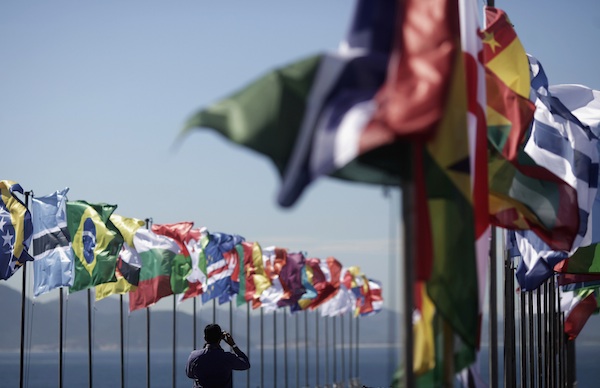
RIO DE JANEIRO (CNS) — With political leaders from around the world gathering in Rio de Janeiro to discuss the future of the planet, Catholic leaders said governments must not forget to put peopleat the forefront of their policies.
At a press conference June 17 at St. Sebastian Cathedral, the Vatican’s apostolic nuncio and permanent observer to the United Nations, Archbishop Francis Chullikatt, reiterated the Holy See’s position that people must remain at the center of policies in all aspects of sustainable development.
“A truly human-centered approach must first and foremost uphold and respect the right to life,” he stated, adding that negotiations for Rio+20 “provide a unique opportunity” for Catholics to foster “deep love and solidarity for all our brothers and sisters around the world.”
The secretary of the Brazilian bishops’ conference, Auxiliary Bishop Leonardo Steiner of Brasilia, also said U.N. delegates should not forget the poor.
“The first to suffer are the poor, and we have the feeling that the poor are not being taken into consideration at Rio+20,” said Bishop Steiner.
Brazilian bishops’ officials said people must understand that they are an integral part of creation and must live in harmony with and respect the other living creatures on the earth. Bishop Steiner said the church is concerned with the way natural resources, such as water, air and soil were being used as commodities by market economies.
“We have to change our relationship with nature,” he said.
Bernd Nilles, secretary-general of CIDSE, an international alliance of Catholic agencies, said a sustainable and just world is a “world of social and environmental justice, in which human rights are respected, in which policy and decision-making are transparent and inclusive, in which the economy serves people and respects the planet.”
Nilles says that the current economic model “focuses on short-term interests and the profits of a small minority, with too little regard for the poorest and most vulnerable people, with too little respect for the environment and too little consideration for future generations.”
Archbishop Chullikatt said if a new economic model is to be created at Rio+20, then it must be based on such principles as responsible production and consumption; promotion and sharing of the common good; access to primary goods (food, water, sanitation, education, health care); and the unity of the family.
“Now is the time for governments to recognize that sustainable development starts with truly putting the human person at the forefront of our efforts,” the archbishop said. “Maybe then, in 20 years’ time, if there is another Rio conference, we will see true progress in the creation of a more just and equitable world for all.”
High-level government officials will gather in Rio June 20-22 to finalize a document for nations to follow. Preparations for Rio+20 have highlighted areas that need prioritized: decent jobs, energy, sustainable cities, food security and sustainable agriculture, water, oceans and disaster readiness.
— By Lise Alves Catholic News Service






